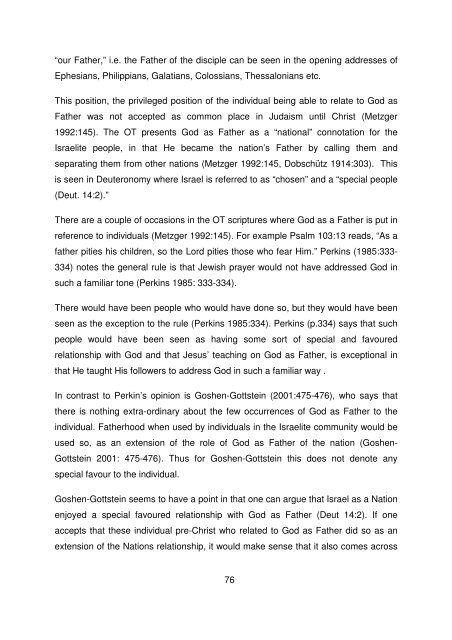O'Donoghue MTh_Thesis-FinalCopy.pdf - South African Theological ...
O'Donoghue MTh_Thesis-FinalCopy.pdf - South African Theological ...
O'Donoghue MTh_Thesis-FinalCopy.pdf - South African Theological ...
Create successful ePaper yourself
Turn your PDF publications into a flip-book with our unique Google optimized e-Paper software.
“our Father,” i.e. the Father of the disciple can be seen in the opening addresses ofEphesians, Philippians, Galatians, Colossians, Thessalonians etc.This position, the privileged position of the individual being able to relate to God asFather was not accepted as common place in Judaism until Christ (Metzger1992:145). The OT presents God as Father as a “national” connotation for theIsraelite people, in that He became the nation’s Father by calling them andseparating them from other nations (Metzger 1992:145, Dobschütz 1914:303). Thisis seen in Deuteronomy where Israel is referred to as “chosen” and a “special people(Deut. 14:2).”There are a couple of occasions in the OT scriptures where God as a Father is put inreference to individuals (Metzger 1992:145). For example Psalm 103:13 reads, “As afather pities his children, so the Lord pities those who fear Him.” Perkins (1985:333-334) notes the general rule is that Jewish prayer would not have addressed God insuch a familiar tone (Perkins 1985: 333-334).There would have been people who would have done so, but they would have beenseen as the exception to the rule (Perkins 1985:334). Perkins (p.334) says that suchpeople would have been seen as having some sort of special and favouredrelationship with God and that Jesus’ teaching on God as Father, is exceptional inthat He taught His followers to address God in such a familiar way .In contrast to Perkin’s opinion is Goshen-Gottstein (2001:475-476), who says thatthere is nothing extra-ordinary about the few occurrences of God as Father to theindividual. Fatherhood when used by individuals in the Israelite community would beused so, as an extension of the role of God as Father of the nation (Goshen-Gottstein 2001: 475-476). Thus for Goshen-Gottstein this does not denote anyspecial favour to the individual.Goshen-Gottstein seems to have a point in that one can argue that Israel as a Nationenjoyed a special favoured relationship with God as Father (Deut 14:2). If oneaccepts that these individual pre-Christ who related to God as Father did so as anextension of the Nations relationship, it would make sense that it also comes across76
















